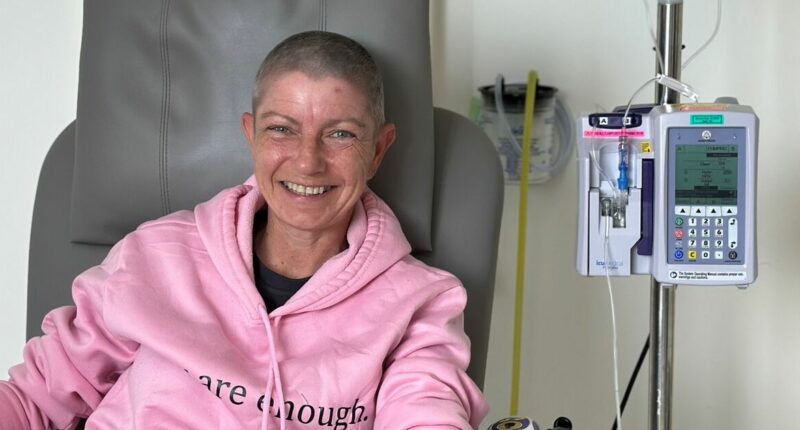Share this @internewscast.com
A physically fit physical education teacher, who endured a swollen abdomen for several months, is calling on people in the UK to listen to their bodies after discovering she had advanced stage-four ovarian cancer. Sharon Withington, 55, initially noticed her stomach was slightly swollen in April 2024 but attributed it to weight gain. Given her active lifestyle and healthy diet, she didn’t think much of it.
It wasn’t until September, five months later, that she visited her general practitioner suspecting a urinary tract infection. After antibiotics proved ineffective, she was referred for an ultrasound and blood tests. By November, medical professionals discovered a 17-centimeter advanced ovarian tumor that had metastasized to her liver. Since then, Sharon has undergone chemotherapy, immunotherapy, and a 12-hour hysterectomy at The Christie NHS Foundation Trust in Manchester.
Sharon is now urging others to pay attention to the warning signs of ovarian cancer, which include persistent bloating, abdominal pain, feeling full quickly, and increased frequency of urination.
Additional symptoms that could indicate ovarian cancer are changes in bowel habits, symptoms resembling new-onset irritable bowel syndrome (IBS) within the past year, digestive issues like heartburn or nausea, unexplained weight loss, and fatigue.
Sharon, who has dedicated nearly 27 years to teaching at Stockport Grammar School, shared, “What prompted me to return to the GP was that, alongside my other symptoms, my stomach inexplicably swelled up like a balloon.”
Sharon, who has worked at Stockport Grammar School for nearly 27 years, told us: “The thing that made me go back to the GP was that, in addition to my other symptoms, my stomach swelled up like a balloon for no reason.
“I put off going back to the doctor for ages even though I knew something was wrong.
“That would be my message for other people – you know your body best, so if something feels even slightly wrong, get it checked out as soon as possible.
“If I’d gone to the GP straight away, I might have avoided more invasive treatment. The NHS has been amazing.
“No one knows what the future holds, but I’m just celebrating where I am now. Thanks to advances in treatment and care, I’m living a very full life, and I feel very lucky.”
Sharon first noticed a slightly swollen stomach in April 2024 but assumed it was weight gain. Fit, active, and eating healthily, she didn’t think much of it.
It wasn’t until September—five months later—when she began leaking wee that she went to her GP. Suspecting a urinary tract infection, Sharon was prescribed antibiotics, but the issue persisted.
After a second round of antibiotics also had no impact, she vowed to go back to her GP after a half-term adventure holiday with her students.
Sharon said: “I looked down and my stomach had grown massively. As a PE teacher, I knew I ate well and exercised regularly so I knew this wasn’t normal.”
Sharon was then referred for an ultrasound and blood tests. By November, a biopsy confirmed she had advanced ovarian cancer, which had spread to her liver with a 17cm tumour.
In December, she began treatment at The Christie NHS Foundation Trust, a specialist cancer centre in Manchester which has included chemotherapy, immunotherapy and a 12-hour operation in April 2025 where she had a full hysterectomy.
Her abdomen was then filled with hyperthermic intraperitoneal chemotherapy (HIPEC). The Christie is one of only two hospitals in the country to offer this specialist treatment.
Despite being diagnosed at stage four – the latest stage when cancer can be diagnosed – recent scans have shown Sharon is now cancer-free.
However, once she finishes her current course of immunotherapy, she will switch to a tablet form which she will take for the rest of her life. This is due to a genetic mutation that makes her risk of ovarian cancer coming back more likely.
She added: “When they told me that I was cancer-free, my jaw dropped to the floor. Someone had to bring me a glass of water. I was that shocked.
“My first couple of sessions of chemo were a bit rough, but I’ve tolerated the rest of my treatment quite well. I don’t get any real side effects from the immunotherapy and am back at Stockport Grammar School teaching hockey.
“Everyone at The Christie has been amazing, they couldn’t do enough for you. On the day I got told there was no evidence of cancer in my body, I actually bumped into one of the nurses who looked after me when I fainted during one of my first chemo sessions. It was a lovely, full-circle moment.”
Dr Jurjees Hasan, Consultant Medical Oncologist at The Christie: “Sharon has done incredibly well following her intense treatment. It’s great to see that she’s back to doing the things she loves – that’s always our goal as clinicians.
“As with most cancers, ovarian cancer is much easier to treat if we catch it early, so I’d encourage anyone who feels bloated, has tummy pain or is peeing more often to go and see their GP as soon as possible.”
While Dr Nadia Ali-Ross, Clinical Lead for Gynaecological Cancers at Greater Manchester Cancer Alliance, said: “Just 1 in 5 women know that persistent bloating can be a symptom of ovarian cancer. Knowing the symptoms could save a life.
“If you are experiencing symptoms like bloating, tummy pain, feeling full quickly or weeing more often, and these are persistent, frequent and new for you, don’t delay in making an appointment with your GP.”











